00096-外刊经贸知识选读-课文翻译-第2课
- 格式:pdf
- 大小:5.21 MB
- 文档页数:7
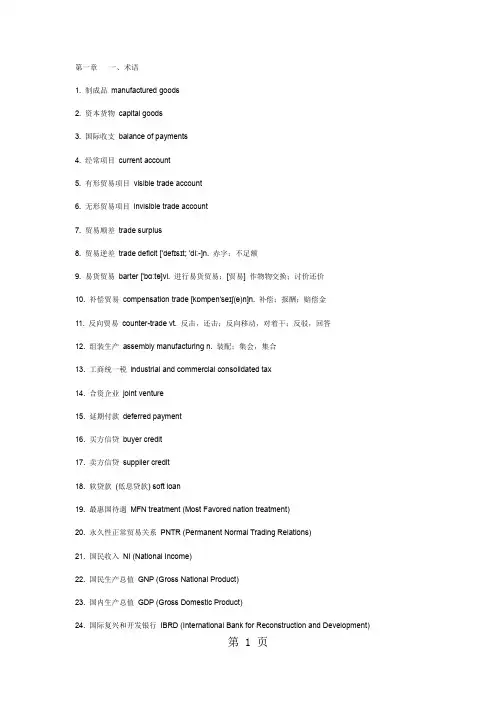
第一章一、术语1. 制成品manufactured goods2. 资本货物capital goods3. 国际收支balance of payments4. 经常项目current account5. 有形贸易项目visible trade account6. 无形贸易项目invisible trade account7. 贸易顺差trade surplus8. 贸易逆差trade deficit ['defɪsɪt; 'diː-]n. 赤字;不足额9. 易货贸易barter ['bɑːtə]vi. 进行易货贸易;[贸易] 作物物交换;讨价还价10. 补偿贸易compensation trade [kɒmpen'seɪʃ(ə)n]n. 补偿;报酬;赔偿金11. 反向贸易counter-trade vt. 反击,还击;反向移动,对着干;反驳,回答12. 组装生产assembly manufacturing n. 装配;集会,集合13. 工商统一税industrial and commercial consolidated tax14. 合资企业joint venture15. 延期付款deferred payment16. 买方信贷buyer credit17. 卖方信贷supplier credit18. 软贷款(低息贷款) soft loan19. 最惠国待遇MFN treatment (Most Favored nation treatment)20. 永久性正常贸易关系PNTR (Permanent Normal Trading Relations)21. 国民收入NI (National Income)22. 国民生产总值GNP (Gross National Product)23. 国内生产总值GDP (Gross Domestic Product)24. 国际复兴和开发银行IBRD (International Bank for Reconstruction and Development)25. 国际开发协会IDA (International Development Association)26. 国际金融公司IFC (International Finance Corporation)27. 经济合作和发展组织OECD (Organization for Economic Cooperation and Development)28. 国际清算银行BIS (Bank for International Settlement)29. 欧洲经济共同体EEC (European Economic Community)30. 欧洲联盟EU (European Union)31. 外商直接投资FDI (Foreign Direct Investment)二、词语释义:1. substantially: dramatically; significantly; considerably大幅度戏剧地;/引人注目地,意味深长地;/值得注目地; /相当地,非常地;2. subsequently: afterwards随后,其后;后来/后来;然后3. exacerbate: deteriorate; worsen; aggravate; make worse使加剧;使恶化;激怒/恶化,变坏/恶化;变得更坏;更坏/加重;使恶化;激怒/使更糟4. withdraw: cancellation撤退;收回;撤消;拉开/取消;删除5. theme: principle6. in return for: in exchange for7. disrupt: interrupt 中断8. destined: designed 注定的,有计划的9. pronounced: marked 显著的;断然的;/显著的;有记号的10. in the wake of: following; after with11. undue: too much; unbearable12. reverse: change to the opposite13. buoyant: brisk14. outcome: result15. boost: stimulate; promote; develop16. recover: rebound17. facilitate: make easy18. run-down: reduction19. mount exhibitions: hold exhibitions20. insofar as: to the extent21. bottlenecks: obstacles三、句子翻译1. During the 1950s China exported agricultural products to the USSR and East European countries in return for manufactured goods and the capital equipment required for the country‘s industrialization program which placed emphasis on the development of heavy industry.20世纪50年代,中国向前苏联和东欧各国出口农产品以换取制成品和国家的工业化计划所要求的资本设备,而国家的工业化计划则强调重工业的发展。
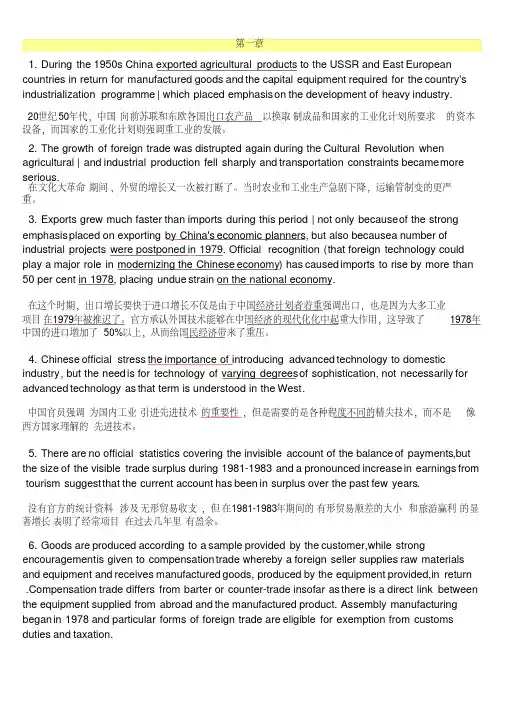
第一章1. During the 1950s China exported agricultural products to the USSR and East European countries in return for manufactured goods and the capital equipment required for the country's industrialization programme | which placed emphasis on the development of heavy industry.20世纪50年代,中国向前苏联和东欧各国出口农产品以换取制成品和国家的工业化计划所要求的资本设备,而国家的工业化计划则强调重工业的发展。
2. The growth of foreign trade was distrupted again during the Cultural Revolution when agricultural | and industrial production fell sharply and transportation constraints became m ore serious.在文化大革命期间,外贸的增长又一次被打断了。
当时农业和工业生产急剧下降,运输管制变的更严重。
3. Exports grew much faster than imports during this period | not only because o f the strong emphasis placed on exporting by China's economic planners, but also because a number of industrial projects were postponed in1979. Official recognition (that foreign technology could play a major role in modernizing the Chinese economy)has caused imports to rise by more than 50 per cent in 1978, placing undue strain on the national economy.在这个时期,出口增长要快于进口增长不仅是由于中国经济计划者着重强调出口,也是因为大多工业项目在1979年被推迟了。
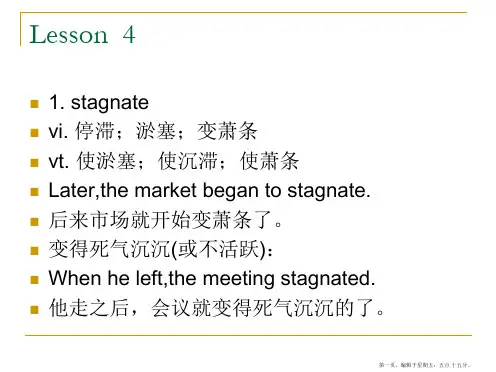
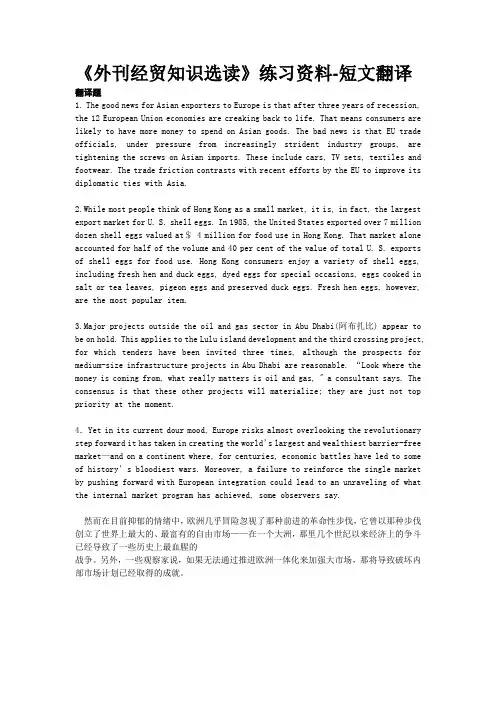
《外刊经贸知识选读》练习资料-短文翻译翻译题1. The good news for Asian exporters to Europe is that after three years of recession, the 12 European Union economies are creaking back to life. That means consumers are likely to have more money to spend on Asian goods. The bad news is that EU trade officials, under pressure from increasingly strident industry groups, are tightening the screws on Asian imports. These include cars, TV sets, textiles and footwear. The trade friction contrasts with recent efforts by the EU to improve its diplomatic ties with Asia.2.While most people think of Hong Kong as a small market, it is, in fact, the largest export market for U. S. shell eggs. In 1985, the United States exported over 7 million dozen shell eggs valued at$ 4 million for food use in Hong Kong. That market alone accounted for half of the volume and 40 per cent of the value of total U. S. exports of shell eggs for food use. Hong Kong consumers enjoy a variety of shell eggs, including fresh hen and duck eggs, dyed eggs for special occasions, eggs cooked in salt or tea leaves, pigeon eggs and preserved duck eggs. Fresh hen eggs, however, are the most popular item.3.Major projects outside the oil and gas sector in Abu Dhabi(阿布扎比) appear to be on hold. This applies to the Lulu island development and the third crossing project, for which tenders have been invited three times, although the prospects for medium-size infrastructure projects in Abu Dhabi are reasonable. “Look where the money is coming from, what really matters is oil and gas, " a consultant says. The consensus is that these other projects will materialize; they are just not top priority at the moment.4.Yet in its current dour mood, Europe risks almost overlooking the revolutionary step forward it has taken in creating the world’s largest and wealthiest barrier-free market—and on a continent where, for centuries, economic battles have led to some of hist ory’s bloodiest wars. Moreover, a failure to reinforce the single market by pushing forward with European integration could lead to an unraveling of what the internal market program has achieved, some observers say.然而在目前抑郁的情绪中,欧洲几乎冒险忽视了那种前进的革命性步伐,它曾以那种步伐创立了世界上最大的、最富有的自由市场——在一个大洲,那里几个世纪以来经济上的争斗已经导致了一些历史上最血腥的战争。
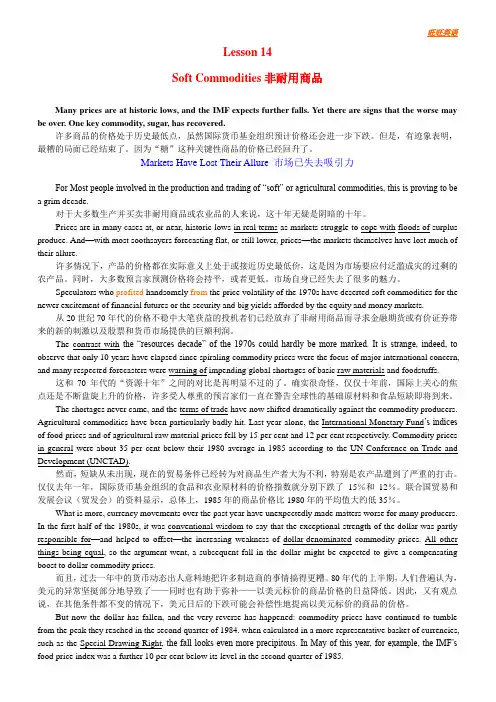
旺旺英语Lesson 14Soft Commodities非耐用商品Many prices are at historic lows, and the IMF expects further falls. Yet there are signs that the worse may be over. One key commodity, sugar, has recovered.许多商品的价格处于历史最低点,虽然国际货币基金组织预计价格还会进一步下跌。
但是,有迹象表明,最糟的局面已经结束了。
因为“糖”这种关键性商品的价格已经回升了。
Markets Have Lost Their Allure 市场已失去吸引力For Most people involved in the production and trading of “soft” or agricultural commodities, this is proving to be a grim decade.对于大多数生产并买卖非耐用商品或农业品的人来说,这十年无疑是阴暗的十年。
Prices are in many cases at, or near, historic lows in real terms as markets struggle to cope with floods of surplus produce. And—with most soothsayers forecasting flat, or still lower, prices—the markets themselves have lost much of their allure.许多情况下,产品的价格都在实际意义上处于或接近历史最低价,这是因为市场要应付泛滥成灾的过剩的农产品。
同时,大多数预言家预测价格将会持平,或者更低。
市场自身已经失去了很多的魅力。
Speculators who profited handsomely from the price volatility of the 1970s have deserted soft commodities for the newer excitement of financial futures or the security and big yields afforded by the equity and money markets.从20世纪70年代的价格不稳中大笔获益的投机者们已经放弃了非耐用商品而寻求金融期货或有价证券带来的新的刺激以及股票和货币市场提供的巨额利润。
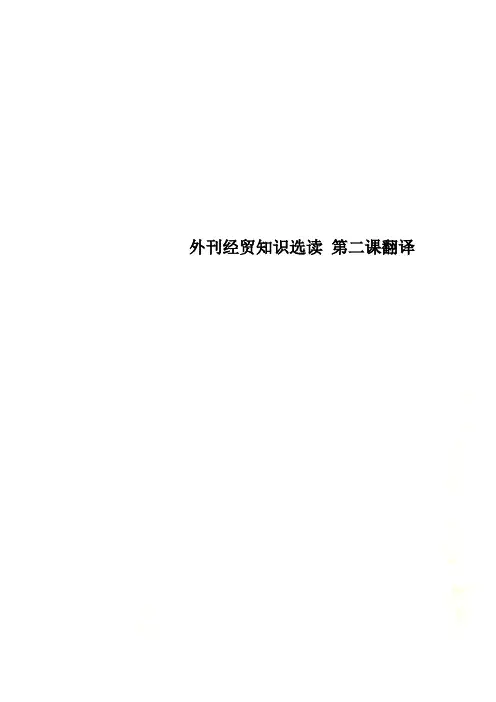
外刊经贸知识选读第二课翻译旺旺英语Lesson 2The curtain goes upPeking permits foreign investment all along itscoastline--- creating differing rules and added confusionBy Mary Lee in BeijingA clearly confident China has rolled up a large section of its bamboo curtain, declared itself “open to the outside world” and hung signs on nearly all its cities inviting foreign investors to come and do serious business.The four special economic zones (SEZs) in Guangdong and Fujian provinces, 14 coastal cities (all former treaty ports) and Hainan island (10 “open” areas in all) have specifically designed tax and other incentives for the foreign investor. But every provincial capital is doing its best to attract foreign investment.The foundation for all this was assembled in piecemeal form, beginning in mid—1979 with the State Council’s decision to set up four SEZs in the south. Then a joint-venture law was published for the first time (albeit one full of holes), quickly followed by procedures for “compensation trade” --- both or which were designed to attract foreign investment to these four zones. The following year, a tax law for joint ventures was promulgated.But even as businessmen battled with bureaucracy in an effort to fulfil their hopes of doing business with a potential market of 1 billon people, Chinese leaders were growing impatient with the rate of progress in the showpiece SEZ—Shenzhen.In April 1984, after the country’s top leaders had visited the Shenzhen, Zhuhai and Xiamen SEZs, the state Council declared 14 cities along the entire coast plus Hainan island open to foreign investment, thus introducing areal element of competition into the country’s economic-development programme. Then came the much-publicised “decision on reform of the economic structure” and suddenly, the race to get foreign technology and funds was on.For foreign investors, the prospect of having access to a market of 1 billion consumers no longer seems like a pipedream. The Chinese—in particular the rural population---are getting richer and now want visible improvements to their standard of living: they aspire to own colour TV sets, refrigerators, trucks, washing machines and better radios, bicycles and clothing. Even local factories are taking note of the vast potential sales in their own domestic market.Recently, State Councillor Gu Mu, head of the China Coastal Cities Economic and Technical Development Corp. (CCETDC) ---the policymaking and coordination body for the 19 “open areas” ---reportedly pronounced the entire coast open to foreign investment. Takenliterally, this does not make much sense as the parts of the coast which have not been “opened” are simply not ready for the demands of foreign businessman. In fact, shantou among the SEZs, and some of the 14 coastal cities plus Hainan are not even equipped with administrative support or infrastructure to cope with the responsibilities which the central government has placed on them.A well-placed source within the CCETDC said Gu in fact was referring to the 19 areas which had been officially opened. The strategy, he said, was a long-term one, to transfer the SEZs experience with new industry to the 14 cities and Hainan, at the same time as this experience was being shared with the country’s inner regions.The central government’s determination to raise the level of industrial technology is clearly behind the decision to open the 14 coastal cities. In addition, China is now ready to spend US $ 14.2 billion fo its foreign-exchangereserves (which stood at US $ 16.5 billion in June 1984) to buy foreign technology. The Bank of China has also said that new and more flexible load policies will enable “thousands” of domestic enterprises to borrow foreign exchange to import equipment and repay in Renminbi.The need to upgrade industrial equipment is great: official figures show that in 1980, 20% of China’s capital stock was already 10-20 years behind that of the West. Another 20% --while technologically backward – worked well, but the remaining 60% should have been scrapped or renovated. The combined industrial output of the 15 coastal areas is reportedly equal to a quarter of the nation’s total.But while the reasons for throwing 19 areas and cities open to foreign investment and technology transfer are clear, how the preferential systems will operate in not. This is due largely to the intensity of competition among the 19, coupled with the inexperience of most local authorities both in making decisionsand in dealing with the outside world. However, there are important difference between the SEZs and the coastal cities and even among the coastal cities themselves.In the SEZs, which are being built-almost from scratch, foreigners can invest in anything which the state deems useful for the country, be it, for example, production of goods for export or construction of private-housing estates. These can be joint ventures, cooperative enterprises or wholly foreign-owned operations. Because every factory or business established in the SEZs is new, imports of capital and consumer goods (except cigarettes and liquor) are exempted from customs duties, and a uniform 15% income-tax rate is applied.In the coastal cities, only factories where plant is being upgraded by foreign investment, enjoy the 15% tax rate (or less for target projects such as transport, energy and telecommunications). Only “key equipment and other materials necessary for technicaltransformation which cannot be readily obtainable in China” will enjoy exemptions from customs duties prior to 1990, according to Gu.However, each coastal city also has been granted the right to establish an Economic and Technical Development Zone (ETDZ) outside the city centre, which will offer a uniform tax rate of 15% for all projects and waive the usual 10% profit-remittance tax.Only the ETDZ in Shanghai (one of the 14 coastal cities) enjoys the same status as the four SEZs. This means that if an enterprise is within the zone, it will enjoy the preferential tax rate of 15%. A joint venture outside the Zone --- involving the setting up of a new factory, and not the upgrading of an existing one --- is liable to the standard 33% tax rate. Tourist enterprises and any other service industry outside the zone –as with similar projects outside the SEZs – are not entitled to any special status.The major source of confusion forforeign investors, however, is not the tax rate but who has the authority to approve projects. The municipal governments of Tianjin and Shanghai have the power to approve projects each coating no more than US $ 30 million. Dalian and Canton have the power to approve projects of less than US $ 10 million each, and the other 10 cities may approve projects involving less than US $ 5 million.One official who is well aware of the confusion afflicting both local authorities and foreign investors is Jing Shuping, president of China International Economic Consultants Inc. which is the consultancy arm of the China International Trust and Investment Corp. The various cities and zones, he said, must discover their own special characteristics, strengths and weaknesses.“We want to stir up the enthusiasm of the grassroots units --- the enterprises --- to get things done,” he said. “We are only just beginning, so the confusion is natural. But if westart putting too many rules and regulations (in an effort to introduce some order to the situation) they will get discouraged. The time will come when the cities and zones will ask for help in coordinating their efforts.”Another source of confusion for the investor lies in the fact that in Guangdong, for instance, there are three SEZs and two “open” areas, Canton and Hainan island. There have been recent complaints from the Hainan government on interference from Canton (the provincial capital) on the exercise of its authority.So, while a comprehensive framework for the country’s modernisation has been provided by th e central committee’s 21 October 1984 decision to reform the economic structure, it will be some time before the dust settles and local authorities and foreign investors can deal with one another in a systematic way. The mountainous bureaucracy facing foreign businessmen has yet to be reduced effectively,despite promises by government.What foreign businessmen find encouraging is that ideology is no longer in the driver’s seat, having been deftly removed with the slogan “Socialism with Chinese char acteristics” and replaced by entrepreneur-ship. Enterprises wholly owned by foreigners are now allowed. Even the oft-repeated phrase “public ownership of the means of production” has been amended with the passage of a law on inheritance which protects private ownership of capital equipment –another way of saying that individuals can now own the means of production.Stock-taking of the open policy will come later this year when the National People’s Congress discusses the seventh five-year plan, which will run to the end of the decade.------From far Eastern Economic Review . 31Jan. , 1985section / 5sekFEn/ n.部分former / 5fR:mE/ a.以前的;旧时的specially / 5speFEli/ ad.明确地;特别地tax / tAks/ n.税incentive / in5sentiv/ n.刺激;鼓励attract / E5trAkt/ v.吸引assemble / E5sembl/ v.汇集;形成piecemeal / 5pi:smi:l/ ad.一件一件地;逐渐地State Council / / 国务院albeit / R:l5bi:it/ conj.尽管procedure / prE5si:dVE/ n.程序;手续promulgate / prR5mElgeit/ v.颁布;公布potential / pE5tenFEl/ a.潜在的showpiece / / n.优秀样品;展出之事物publicize / 5pQblisaiz/ v.引起公众对...注意;(尤指用广告)宣传fund / fQnd/ n.资金prospect / 5prRspekt, prEs5pekt/ n.前景pipe dream / / n.白日梦;幻想aspire / Es5paiE/ v.渴望vast / va:st/ a.巨大的state councilor / / 国务委员pronounce / prE5nauns/ v.宣告;宣布administrative / Ed5ministrEtiv/ a.管理的;行政的infrastructure / 5infrEstrQktFE/ n.基础设施cope (with) / / v.(成功地)应付;(妥善地)处理strategy / 5strAtidVi/ n.战略long-term / / a.长期的transfer / trAns5fE:/ v.搬;使转移inner regions / / 内地foreign-exchange reserves / / 外汇储备repay / ri:5pei/ v.偿还;付还(钱)upgrade / 5Qp5greid/ v.提高;改善remaining / / a.剩余的;其余的scrap / skrAp/ v.刮(擦)净;除掉technology transfer / / 技术转让intensity / in5tensiti/ n.强烈;激烈(to start) from scratch / / 从零(开始)deem / di:m/ v.认为;相信estate / is5teit/ n.地产;财产wholly foreign-owned / / 外商独资拥有的operation / 5RpE5reiFEn/ n.企业business / 5biznis/ n.工商企业capital goods / / 资本货物consumer goods / / 消费品liquor / 5likE/ n.酒类uniform / 5ju:nifR:m/ a.(税收、法律等)一样的;一致的plant / pla:nt/ n.全套设备readily / 5redili/ ad.无困难地;容易地prior (to) / / ad.在...之前grant / gra:nt/ v.给予;授予waive / weiv/ v.放弃;不坚持要求profit-remittance / / 利润汇款status / 5steitEs/ n.地位preferential tax rate / / 优惠税率be liable to / / 有义务的;应付(税)的entitle (to) / / v.给...权利;给...资格authority / R:5WRriti/ n.权;权利approve / E5pru:v/ v.批准;核准municipal / mju:5nisipEl/ a.市(政)的affict / / v.使苦恼;折磨consultant / kEn5sQltEnt/ n.顾问consultancy / kEn5sQltEnsi/ n.(承接咨询业务的)顾问服务公司strengths and weaknesses / / 优缺点stir (up) / / v.激起;鼓励grassroots / / a.群众的;基层的complaint / kEm5pleint/ n.抱怨;抗议interference / 5intE5fiErEns/ n.干预;扰乱exercise / 5eksEsaiz/ v.(官能、力量、权利等的)行驶;运用;执行comprehensive / 5kRmpri5hensiv/ a.广泛的;综合的framework / 5freimwE:k/ n.准则has yet to / / 有待ideology / aidi5RlEdVi/ n.思想意识in the driver's seat / / 处于统治(或控制)地位deftly / / ad.机敏地remove / ri5mu:v/ v.移开;挪走entrepreneurship / / n.企业家精神oft-repeated / / 反复说的means of production / / 生产资料amend / E5mend/ v.修改;修订inheritance / in5heritEns/ n.继承权protect / prE5tekt/ v.保护stock-taking / / 盘货;评估;估量National People's Congress / / 全国人民代表大会1.…tax and other incentives for the foreign investor … to attract foreign investment.2.… a tax law for joint ventures was promulgated.3.… Chinese leader s were growing impatient with the rate of progress in the showpiec e SEZ-Shengzhen.4.… thus introducing a real element of competition into the country’s economic-development programme.5.Even local factories are taking note of the vast potential sales in their own domestic market.6.The central govemment’s determination to raise the level of industrial technology is clearly behind the decision to open the 14coastal cities.7.… repay in Renminbi.8.The need to upgrade industrial equipment …9.The combined industrial output of the 15 coastal areas …10.the preferential systems11.the intensity of competition12.private-housing estates.13.Wholly foreign-owned operations14. A uniform 15% income-tax15.… plant is being upgraded by foreign investment …16.… waive the usual 10% profit-remittance tax.17. A joint venture outside the zone … is liable to the standard 33% tax rate.18.Tourist enterprises and any other service industry outside the zone … are not entitled to any special status.19.… who has the authority to approve projects.20.The consultancy arm21.rules and regulations22.… it will be some time before the dust settles…23.Stock-taking of the open policy。
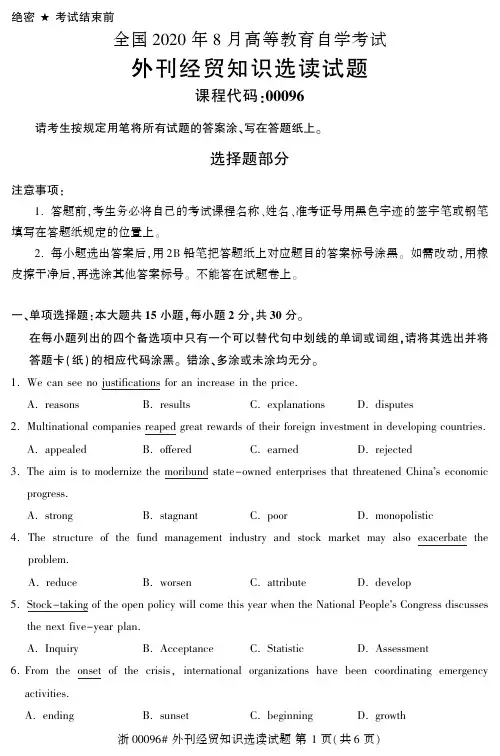
绝密★考试结束前全国2020年8月高等教育自学考试外刊经贸知识选读试题课程代码:00096 请考生按规定用笔将所有试题的答案涂㊁写在答题纸上㊂选择题部分注意事项: 1.答题前,考生务必将自己的考试课程名称㊁姓名㊁准考证号用黑色字迹的签字笔或钢笔填写在答题纸规定的位置上㊂ 2.每小题选出答案后,用2B铅笔把答题纸上对应题目的答案标号涂黑㊂如需改动,用橡皮擦干净后,再选涂其他答案标号㊂不能答在试题卷上㊂一㊁单项选择题:本大题共15小题,每小题2分,共30分㊂在每小题列出的四个备选项中只有一个可以替代句中划线的单词或词组,请将其选出并将答题卡(纸)的相应代码涂黑㊂错涂㊁多涂或未涂均无分㊂1.We can see no justifications for an increase in the price.A.reasonsB.resultsC.explanationsD.disputes2.Multinational companies reaped great rewards of their foreign investment in developing countries.A.appealedB.offeredC.earnedD.rejected3.The aim is to modernize the moribund state-owned enterprises that threatened China’s economic progress.A.strongB.stagnantC.poorD.monopolistic4.The structure of the fund management industry and stock market may also exacerbate the problem.A.reduceB.worsenC.attributeD.develop5.Stock-taking of the open policy will come this year when the National People’s Congress discusses the next five-year plan.A.InquiryB.AcceptanceC.StatisticD.Assessment6.From the onset of the crisis,international organizations have been coordinating emergency activities.A.endingB.sunsetC.beginningD.growth7.The government plans to curtail economic growth to avoid speculative bubbles.A.enlargeB.continueC.assistD.restrict8.The America’s formidable capital and technological resources would be utilized to meet its objectives.A.powerfulB.availableC.vastD.different9.The law banned discrimination against people with physical disabilities in the workplace.A.equalityB.fairnessC.differentiationD.protection10.Investment funds have moved out of commodities and into liquid assets.A.water resourcesB.current assetsC.real estateD.fixed assets11.With unemployment rate at9.7%,the president is pressing the Congress to approve financial incentives for small businesses to add workers.A.controlB.capitalC.toolsD.stimulation12.9%of listed firms are technically insolvent and have stopped paying their debts.A.privateB.publicC.bankruptD.unsuccessful13.A substantial proportion of loans from the World Bank is still to be disbursed.A.borrowedB.paidC.declinedD.recovered14.This marks the first time in history that these companies will be subject to federal supervision.A.be free fromB.be exchanged byC.be occupied inD.be subordinated to15.Online education is a fledgling sector where no perfect model has been created.A.inexperiencedB.matureC.unfinishedD.uncertain二㊁判断题:本大题共10小题,每小题2分,共20分㊂判断下列各题,在答题卡(纸)相应位置正确的涂 A”,错误的涂 B”㊂Passage1Force of the Multinationals Direct investment by multinational companies is becoming a hugely important force in the world economy.In essence,a combination of factors,such as the development of global communications and a change in the political climate towards multinationals,is bringing in an era of true global manufacturing.A company such as Siemens may now start making a product in Germany then ship itto Malaysia for the labor⁃intensive final stages of manufacture.The strategy by Japanese companies of locating production in cheaper Far Eastern countries such as Thailand has done much to integrate the economies of the companies were setting up production in Mexico,for similar reasons,before negotiations on the NAFTA had even started.There is an important distinction to be made between the kind of integration based on trade,which is relatively simple,and the far more complex links involved in global manufacturing.The report says that as integration moves from shallow trade-based linkages to deep international production-based linkage under the common governance,the traditional division between integration at the corporate and country levels begins to break down.” Foreign direct investment tends to transfer assets from the developed world to the developing world.But the pattern is not entirely simple.Big shifts have occurred in the composition of foreign direct investment by sector.Increasing investment is going into services and high⁃tech manufacture, rather than basic manufacture and natural resources.As might be expected,foreign direct investment in the developed world is mostly in the former category,whereas in the developing world the emphasis is on the latter.It seems countries have to reach a basic level of sophistication before they can get in the act.Simple cash incentives to set up production in a country have little effect, other than on margin.In addition,the increasing sophistication of global production means that cheap labor is often not a deciding factor either.16.International production⁃based integration is better than trade⁃based integration.bor⁃intensive manufacture is the production mainly depend on the use of a large number of labor. companies set up production in Mexico for its cheaper labor and cost.19.Cash incentive is a deciding factor in global production.20.Foreign direct investment in the developed countries is mostly in services and high⁃tech sector.Passage2Asia,You Cost Too Much The Asian economic miracle can be best summed up as the biggest price undercut in history. Asia grew because it was the cheapest source for the low⁃tech consumer goods that the West craves. Hong Kong and Korea didn’t invent new or more efficient manufacturing techniques,they simply bought market share with low wages.But now Asia is beginning to cost too much.If you still thinkAsia is cheap or even a bargain,compare office rents in Shanghai with those in Chicago and Paris. Or try to hold a qualified manager in China against the almost weekly job offers he receives due to the shortage of Chinese professionals.No wonder companies are voting with their feet in response to Asia’s rising cost.Germany’s Siemens is dumping Singapore in favor of lower cost locations in the region.The way things are going,Siemens may have to move again before too long. The competition facing Asia is not going to let up,either Local council representatives from Britain are running all over the world advertising tax cuts,giving away state land and slashing bureaucracy in an effort to attract industry.Technological innovations and cost reduction in communications and transport mean that location isn’t as important as it once was.Only Singapore seems to understand that keeping up isn’t good enough and that being competitive means forging ahead.The Lion City made a concerted effort to open market,cut government regulations and create transparency.But most Asian government just don’t seem to understand the relationship between high costs and low competitiveness.Otherwise why would tariffs on agricultural imports be crippling the Korean and Japanese food processing industries?The oligarchical nature of trucking in Malaysia guarantees that high transport costs will drive business away.n economic growth was primarily based on cheap exports rather than high technology.22.Siemens is satisfied with Singapore’s low cost and will stay there all the time.23.High rents and shortage of professionals became China’s disadvantage in Business.24.The importance of location is weakened by technology and communication innovations.25.Most Asian government learned from Singapore to open markets and cut tariffs.非选择题部分注意事项: 用黑色字迹的签字笔或钢笔将答案写在答题纸上,不能答在试题卷上㊂三㊁将下列中文词组译成英文:本大题共10小题,每小题1分,共10分㊂26.经济特区27.出口配额制28.消费品29.批发商30.贸易差额31.服务部门32.垄断33.最惠国待遇34.硬通货35.经常项目四㊁将下列英语单词或词组译成中文:本大题共10小题,每小题1分,共10分㊂36.market forces37.countertrademercial hub39.intellectual property right40.brain trust41.austerity programmes42.the General Agreement on Tariffs and Trade43.discount rate44.countervailing duty45.dumping五㊁简答题:本大题共6小题,每小题3分,共18分㊂Passage1 Once,when Japan faced pressure from abroad,it would either give in reluctantly or keep quiet and hope that the fuss would die down.No longer it seems.America wants Japan to meet import targets for some American goods,but far from capitulating to the thrust of American trade policy, Japan is taking a stand that could lead to a trans-Pacific confrontation.The annual white paper on trade development published by the Ministry of International Trade and Industry will reject the argument that Japan needs special trade sanctions.It is Japan’s persistent surplus,more than anything,that has provoked anger in Washington.This year the surplus has been growing fast.With the economy still barely growing,despite two fiscal packages in the past nine months,Japan’s critics say that the country is once more exporting its way out of recession.46.Which word can give in”be replaced by?47.Explain the fuss would die down”.48.Paraphrase exporting its way out of recession”.Passage2 The price of tin on the European spot market rose to4,400pounds per ton,reflecting widespread production cuts in the world tin industry,at a two-day meeting in Indonesia,theassociation of tin-producing countries,whose members represent70percent of world tin output, decided to strengthen their co-operation in a bid to stabilize tin prices and to call on the United States to limit sales of tin from its strategic stockpile.Platinum progressed at the outset on concern about strike action in South African mines but quickly fell victim to profit-taking as work resume.49.What is strategic stockpile”?50.What does progress”mean in the context?51.What is profit-taking in business?六㊁翻译题:本大题12分㊂52. Commerce among nations entered a modern era;the constrained trading between imperial powers and their colonies began to break down.World markets opened to all countries,and multilateral trade flourished.Generally,a country could sell its goods in the best market it could find and buy what is needed from the least expensive supplier.Moreover,since currencies were convertible,most transactions could be completed with cash.Barter was as antiquated as the horse⁃soldier.During the past few years,however,the international monetary system has begun to strain under a variety of economic changes.One important cause is the enormous burden of debt carried by Third World countries.A professor at Harvard University says, The plain fact is that many countries are broken.”绝密★启用前2020年8月高等教育自学考试全国统一命题考试外刊经贸知识选读试题答案及评分参考(课程代码 00096)一㊁单项选择题:本大题共15小题,每小题2分,共30分㊂1.A2.C3.B4.B5.D6.C7.D8.A9.C10.B 11.D12.C13.B14.D15.C二㊁正误判断题:本大题共10小题,每小题2分,共20分㊂16.B17.A18.A19.B20.A 21.A22.B23.A24.A25.B三㊁将下列中文词组译成英文:本大题共10小题,每小题1分,共10分㊂26.The Special Economic Zone27.export quota system28.consumer goods29.wholesaler30.trade balance31.the service sector32.monopolize33.most⁃favored nation treatment34.hard currency35.current account四㊁将下列英文单词或词组译成中文:本大题共10小题,每小题1分,共10分㊂36.市场力量37.对等贸易(反向贸易)38.商业活动中心39.知识产权40.智囊团41.紧缩计划42.关贸总协定43.贴现率44.反补贴税45.倾销五㊁简答题:本大题共6小题,每小题3分,共18分㊂Passage146.surrender or yield47.nervous activities become weaker48.get through the recession by exportingPassage249.Strategic stockpile is the stock for future use when faced with extremely difficult situations.50.Price goes up.51.to profit in a price fluctuation on an exchange by selling what one has bought at a lower pricewhen the price goes up.六㊁翻译题:本大题12分㊂52.国家间商贸进入了新的纪元;帝国主义列强及其殖民地间的强制性贸易开始崩溃㊂(2分)世界市场向所有国家开放,多边贸易开始繁荣㊂(2分)一般来说,一个国家可以在其能找到的最有利的市场上销售其货物,也能从最廉价的供应商那里购得它所相应的货物㊂(2分)而且,因为货币可以兑换,大部分交易可以用现金支付,易货贸易就像骑兵一样时过境迁了㊂(2分)然而,在过去的几年里,国家货币体系在种种经济变化影响下,开始承受着巨大的压力㊂(2分)一个重要的原因是第三世界国家的巨大债务负担㊂哈佛大学一位教授说: 显而易见,许多国家都已经破产了㊂”(2分)。
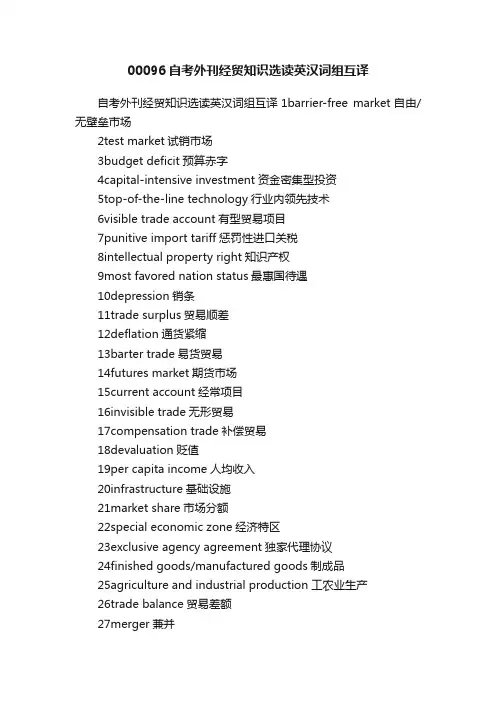
00096自考外刊经贸知识选读英汉词组互译自考外刊经贸知识选读英汉词组互译1barrier-free market自由/无壁垒市场2test market试销市场3budget deficit预算赤字4capital-intensive investment资金密集型投资5top-of-the-line technology行业内领先技术6visible trade account有型贸易项目7punitive import tariff惩罚性进口关税8intellectual property right知识产权9most favored nation status最惠国待遇10depression销条11trade surplus贸易顺差12deflation通货紧缩13barter trade易货贸易14futures market期货市场15current account经常项目16invisible trade无形贸易17compensation trade补偿贸易18devaluation贬值19per capita income人均收入20infrastructure基础设施21market share市场分额22special economic zone经济特区23exclusive agency agreement独家代理协议24finished goods/manufactured goods制成品25agriculture and industrial production工农业生产26trade balance贸易差额27merger兼并28market force市场力量29monetary policy货币政策30world trade organization世界贸易组织31personal/individual income tax个人所得税32commodity/goods market商品市场33service trade服务贸易34primary goods初级产品35international monetary fund国际货币基金组织36per capita GDP(gross domestic product)人均国内生产总值37convertible currency可兑换货币38customs duties and taxation海关关税39good infrastructure 良好的基础设施40deinflationary policy反通货膨胀政策41trade sanction贸易制裁42at the summit meeting峰会43on a conservative estimate据保守估计44price hike价格上涨45self-sufficient自给自足46liquid assets流动资产47trade fairs and exhibitions贸易展销会48preferential tax rate优惠关税49vested interests既得利益50export quota出口配额51government procurement政府采购52European integration欧洲一体化53bilateral pacts双边条约54countervailing duty反补贴税5524.fledgling industries新兴工业56stock market股票市场57capital transfer资本转移58trade discrimination贸易歧视59bilateral trade双边贸易60European continent欧洲大陆61carbon tax双重税62state-owned enterprises国有企业63competitive advantage竞争优势64balance of payments国际收支65high-tech高技术66portfolio investment证券投资67free market自由市场68trade barriers贸易壁垒69glut of supply供应过剩70equivalent value对等价值71economic recession经济衰退72unfair trade不平等交易73exclusive contract独家经销合同74per capita income人均收入75long-term strategy长期战略76GATT关税及贸易总协定77financial crisis金融危机78trade representative商务代表79physical market现货市场80financial deregulation撤销金融管制规定81sovereignty dispute主权争端82hard currency硬通货83merger of banks银行兼并84a hermit naiton闭关自守的国家85trade negotiation贸易谈判86at a rough estimate据粗略估计87Chinese export commodities fair中国出口商品交易会88foreign exchange reserve外汇储备89debt sevice/interest payment利息付款90sole foreign funded外商独资91technology transfer技术转让92domestic demand国内需求93export oriented出口导向94trade balance贸易差额95certificate of origin产地证书96customs duties进口税97clearing agreement清算协议98real estate房地产99business cycle商业周期100fiscal packages财政一揽子计划101debt service利息付款102 good resistance强阻力103cash crops经济作物104GNP国民生产总值105deinflationary policy反通胀政策106short supply供应短缺107the World Bank世界银行108capital goods资本货物109productive force生产力110foreign exchange earnings外汇收入111profit-remittance 利润汇款112national income国民收入113closing level收盘价。
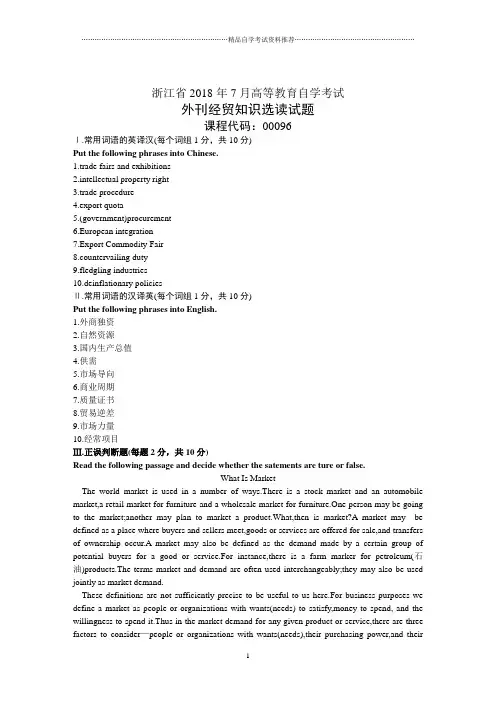
浙江省2018年7月高等教育自学考试外刊经贸知识选读试题课程代码:00096Ⅰ.常用词语的英译汉(每个词组1分,共10分)Put the following phrases into Chinese.1.trade fairs and exhibitions2.intellectual property right3.trade procedure4.export quota5.(government)procurement6.European integration7.Export Commodity Fair8.countervailing duty9.fledgling industries10.deinflationary policiesⅡ.常用词语的汉译英(每个词组1分,共10分)Put the following phrases into English.1.外商独资2.自然资源3.国内生产总值4.供需5.市场导向6.商业周期7.质量证书8.贸易逆差9.市场力量10.经常项目Ⅲ.正误判断题(每题2分,共10分)Read the following passage and decide whether the satements are ture or false.What Is MarketThe world market is used in a number of ways.There is a stock market and an automobile market,a retail market for furniture and a wholesale market for furniture.One person may be going to the market;another may plan to market a product.What,then is market?A market may be defined as a place where buyers and sellers meet,goods or services are offered for sale,and transfers of ownership occur.A market may also be defined as the demand made by a certain group of potential buyers for a good or service.For instance,there is a farm marker for petroleum(石油)products.The terms market and demand are often used interchangeably;they may also be used jointly as market demand.These definitions are not sufficiently precise to be useful to us here.For business purposes we define a market as people or organizations with wants(needs) to satisfy,money to spend, and the willingness to spend it.Thus in the market demand for any given product or service,there are three factors to consider—people or organizations with wants(needs),their purchasing power,and theirbuying behavior.We shall employ the dictionary definition of needs:the lack of anything that is required,desired,or useful.We do not limit needs to the narrow physiological(生理的)requirements of food,clothing and shelter essential for survival.In our discussion the words needs and wants are used synonymously and interchangeably.In strict interpretation,however,needs would refer to such basic physiological requirements as food,clothing,and shelter,while wants would be nonbasic preferences.However,in our affluent society,little is to be gained by trying to differentiate between the two.Many of us would see as needs some items that are far beyond food,clothing,and sheltter. 1.According to the passage,the word“market”can be used in different occasions and thereforeacquire different meanings.( )2.The sentence“…there is a farm market for petroleum products.”indicates that “market”and“demand”are sometimes synonyms.( )3.In the commercial field,the concept of market involves only people with wants.( )4.The words “needs”and “wants”can be used synonymously and interchangeably because theyboth suggest the lack of something.( )5.The passage is mainly about why people are confused with needs and wants.( )Ⅳ.单项选择题(每题2分,共20分)Choose one answer that best explains the underlined part or what is required in the following statements.1.In April,the EC imposed a ban on livestock,meat,and dairy products from 18 eastern countries following an outbreak of hoof and mouth disease in Croatia.( )A.levied a high tariffB.adopted quota systemC.limited the import volumeD.shut out imports2.Hire a commission buying agent who finds sources abroad on behalf of the principal.( )A.head of an educational institutionB.person who commits a crimeC.main actor or performerD.one who employs another to act as his agent3.An in-ouse service gives managers direct contact with foreign suppliers, an advantage to a firm that has a large volume of overseas purchasing.( )A.a business carried on in shelter,not in openB.a deal concluded in one's own countryC.an entertainments given to suppliersD.a negotiation with the supplier in one's own company4.But it often allows the purchaser a say in product specifications.( )A.revision to his requirementsB.room for bargainingC.right to decideD.presentation of complaint5.It is also the only way to ensure product exclusivity.( )A.right of only sale of a product,not shared by othersB.a competitive edge in sale of a productC.an advantage over other firms in sale of a productD.a small number of a product only6.Direct buying enables companies to do a better job of product development with key vendors.( )A.producersB.sellersC.consumersD.buyers7.Officials on both sides were optimistic that a deal on farming,which would unlock the rest of the round,was within reach.( )A.solveB.openC.tightenD.close8.Sony had to shrink 2,000 components into a space one quarter the size they occupy in a conventional camcorder.( )A.condenseB.add up toC.leave offD.make lighter9.With a target to aim at,the coverers know that the innovation is at least technically feasible.( )A.strongB.stableC.advancedD.possible10.Tourists enterprises and any other service industry outside the zone are not entitled to any special status.( )A.have no power toB.are not interested inC.have no right toD.are not obliged toⅤ.英译汉(每题4分,共40分)Translate the following sentences into Chinese.1.We will also implement the “going out”strategy,encouraging viable enterprises to invest abroad.This will enable us to take advantage of both the domestic and international markets.2.After China joins the WTO,consumers on the mainland will start to find more choices in their shops,including many new items from overseas.3.International marketing is important because the world has become globalized.International marketing takes place all around us every day, and has a major effect on our lives.4.Technology transfer is the transfer of systematic knowledge for the manufacture of a product,for the application of a process,or for the rendering of a service.The elements of the transfer are “human ware”,“soft ware”and “hard w\are”.5.Foreign direct investment tends to transfer assets from the developed world to the developing world.But the pattern is not entirely simple.6.We are not safely beyond a backlash against the new world of competition.7.Hong Kong and Korea didn't invent new or more efficient manufacturing techniques.They simply bought market share with low wages.8.Globalisation has aroused worries in many rich countries that free trade with much poorer countries threatens jobs and prosperity.This was plain in last year's debate in the United States over expanding the North American Free Trade Agreement.9.The world economy has sneezed,the mainland's export sector has caught a cold,and Hong Kong is suffering from influenza.There is no quick cure medication.10.The company's new formula was designed partly to keep Coke's sales growing overseas. Compared with Americans,who guzzle more soda than water,the rest of world is still in the sipping stage.Ⅵ.短文提问(每题2分,共10分)Read the following passage and answer the questions in English.Given the stakes involved,it's not surprising that the issue has become politically volatile.The outspoken opposition leaders of the National Assembly routinely criticize the government forgranting special tax breaks to the chaebol,which they argue have impeded the growth of small businesses and stymied entrepreneurship.1.What does “given”mean here?2.What is “the stakes”?3.Why was the government criticized by the outspoken opposition leaders?4.Give one synonym for “businesses”.5.What is the meaning of “involved”here?。
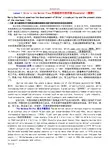
Lesson 1 China in the Market Place市场经济中的中国(Excerpts)(摘录)Barry Coulthurst examines the development of China’s trade policy and the present state of the overseas links--巴里库尔塞斯特对中国贸易政策的演变和当前与海外经济往来状况的研究自从中华人民共和国成立以来,中国对外贸易的模式发生了巨大的变化。
20世纪50年代,中国向苏联和东欧国家出口农产品换取制造品和资本设备,用于侧重于重工业发展所必须的工业化项目。
1958~1959年的“大跃进”最初在工农业生产上带来收益,但随后又导致了严重的经济平衡。
三年自然灾害(1959-1961)加剧了经济问题,造成1960-1962年间的国民收入和对外贸易额的减少。
20世纪60年代,苏联经济和技术援助撤走,导致了中国与苏联及经互会成员国的贸易转向于日本和西欧国家的贸易。
中国对外贸易政策的一贯宗旨是重视与第三世界国家发展贸易关系。
“文化大革命”期间(1966-1976)工农业生产一落千丈,交通运输限制更加严重,中国对外贸易的增长再次中断。
The Sino-USA agreement on trade relations, which came into force(解释:施行)in February 1980, accords China most-favoured nation treatment.(最惠国待遇)在实现四个现代化中起着很大作用的对外贸易在近几年发展很快。
1978年2月于日本签订了一个主要贸易协定,根据这个协定,中国向日本出口每盒石油换取工业设备和技术。
1978年中国也与欧共体签订了长期贸易协定,继1979年初与美国的外交关系正常化以后,中美贸易发展迅速。
美国遵照1980年1月25日生效的中美贸易关系协定给与中国最惠国待遇。
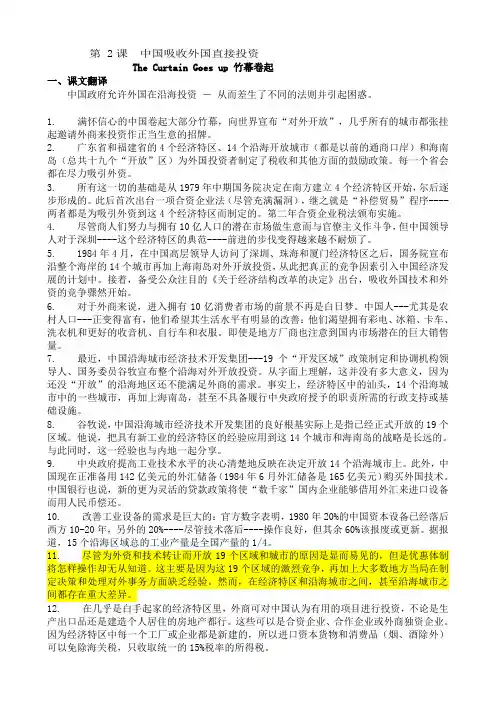
第 2课中国吸收外国直接投资The Curtain Goes up 竹幕卷起一、课文翻译中国政府允许外国在沿海投资― 从而差生了不同的法则并引起困惑。
1. 满怀信心的中国卷起大部分竹幕,向世界宣布“对外开放”,几乎所有的城市都张挂起邀请外商来投资作正当生意的招牌。
2. 广东省和福建省的4个经济特区、14个沿海开放城市(都是以前的通商口岸)和海南岛(总共十九个“开放”区)为外国投资者制定了税收和其他方面的鼓励政策。
每一个省会都在尽力吸引外资。
3. 所有这一切的基础是从1979年中期国务院决定在南方建立4个经济特区开始,尔后逐步形成的。
此后首次出台一项合资企业法(尽管充满漏洞),继之就是“补偿贸易”程序----两者都是为吸引外资到这4个经济特区而制定的。
第二年合资企业税法颁布实施。
4. 尽管商人们努力与拥有10亿人口的潜在市场做生意而与官僚主义作斗争,但中国领导人对于深圳----这个经济特区的典范----前进的步伐变得越来越不耐烦了。
5. 1984年4月,在中国高层领导人访问了深圳、珠海和厦门经济特区之后,国务院宣布沿整个海岸的14个城市再加上海南岛对外开放投资,从此把真正的竞争因素引入中国经济发展的计划中。
接着,备受公众注目的《关于经济结构改革的决定》出台,吸收外国技术和外资的竞争骤然开始。
6. 对于外商来说,进入拥有10亿消费者市场的前景不再是白日梦。
中国人---尤其是农村人口---正变得富有,他们希望其生活水平有明显的改善:他们渴望拥有彩电、冰箱、卡车、洗衣机和更好的收音机、自行车和衣服。
即使是地方厂商也注意到国内市场潜在的巨大销售量。
7. 最近,中国沿海城市经济技术开发集团---19个“开发区域”政策制定和协调机构领导人、国务委员谷牧宣布整个沿海对外开放投资。
从字面上理解,这并没有多大意义,因为还没“开放”的沿海地区还不能满足外商的需求。
事实上,经济特区中的汕头,14个沿海城市中的一些城市,再加上海南岛,甚至不具备履行中央政府授予的职责所需的行政支持或基础设施。
一、单项选择题(本大题共15小题,每小题2分,共30分)在每小题列出的四个备选项中只有一个可以替代句中划线的单词或词组,请将其选出并将答题卡(纸)的相应代码涂黑。
错涂、多涂或未涂均无分。
1. The pattern of China's foreign trade has changed substantially since China opened to the outside world.A. considerablyB. partiallyC. scarcelyD. suddenly2. The sophistication of the industrial structure needs the support of advanced technology.A. buildingB. upgradeC. completionD. reform3. A number of countries in the EU are confronted with debt problems.A. angryB. disappointedC. concernedD. faced4. By opening the district to foreign investments,competition was introduced into its economy.A. exclusiveB. recommendedC. broughtD. imposed5. If an enterprise is within the zone,it will enjoy a preferential tax rate.A. highB. favoredC. lowD. free6. American industry was booming by the autumn of 1942.A. flourishingB. diminishingC. decreasingD. changing7. A surplus of exports over imports will boost employment.A. influenceB. harmC. promoteD. dampen8.Increase in China's growth rate helped to sustain high rate of growth in the East Asian region.A. createB. getC. pushD. maintain9. Government procurement of recycled paper stimulates recycling.A. spendingB. purchasingC. supportingD. propaganda10. As Europe's economy has soured,free-market ideas face new challenges.A. developedB. changedC. worsenedD. grown11. What the community had completed was the legal framework,but not the blueprint for how the single market would actually work.A. stepB. planC. wayD. goal12. In 1992,China ousted the US to become the second largest exporter to the emirate.A. followedB. caughtC. expelledD. replaced13. The draft agreement contains many sensible new rules for global trade.A. concludesB. includesC. excludesD. continues14. Unstable crude prices prompted falls in platinum and gold.A. SteadyB. UnsuitableC. UnbearableD. Unsteady15. This year the company hiked Sprite's advertising budget to $40 million.A. roseB. slashedC. raisedD. reduced二、判断题(本大题共10小题,每小题2分,共20分)判断下列各题,在答题纸相应位置正确的涂“A”,错误的涂“B”。
旺旺英语Lesson 12Soft Drink Wars: the Next Battle 软饮料战:下一次战争The reformulation of Coke has given the feuding cola giants a chance to go at each other again.可口可乐的重新配方为长期不和的可乐巨头提供了一个新开战的机会。
But Coca-Cola and PepsiCo are spoiling for yet another fight, and this time they’re picking on the little guys: non-cola makers like Seven-Up and Dr Pepper.By Monci Jo Williams 但是可口可乐和百事可乐一心想进行另一场战斗,这一次它们选中了小企业:“七喜”和“佩拍博士”。
In the U.S. soft drink industry, where 1% of the market is worth $ 300 million in retail sales, Coca-Cola and PepsiCo don’t wage mere market share battles. They fight holy wars. These days the fighting is on two fronts. One is on the vast plains of the cola business, where the reformulation of Coke has Pepsi on the defensive. The other is in the back alleys of the smaller, non-cola market. Until now these have been dominated by other companies. As growth of high-calorie colas slows, however, Coca-Cola and PepsiCo are invading new territory.在美国的软饮料行业,1%的市场份额就意味着3亿美元的零售额,可口可乐公司和百事可乐公司进行的不仅仅是争夺市场份额的斗争,他们进行的是“圣战”。
外刊经贸知识选读(贸易术语翻译)1中国的对外贸易Nationai income 国民收入EEC(European Economic Association) 欧共体Most-favored nation treatment 最惠国待遇Visible trade account 有形贸易收支Minister without portfolio 不管部长Balance of payments 国际收支Invisible account 无形的贸易收支Current account 经常项目Center bank 中央银行Counter-trade 反向贸易Joint venture 合资企业OCCE(organization for economic co-operation and development) 经济合作发展组织Bank for settlements international 国际清算银行Non-bank trade related credits 买方信贷,卖方信贷等Manufactured goods工业产品Capital equipment 资本设备Industrialization programme 工业项目Heavy industry 重工业Economic imbalances 经济失衡Trade relating 贸易往来Per annum 每年Normalization of diplomatic relations 外交关系正常化Industrial country 工业国家In surplus 顺差Earnings and requirements 收入和需求Trade fairs 商品展销会Compensation trade 补偿贸易Raw materials 原材料Direct investment 直接投资The international capital markets 国际资本市场Commercial terms 商业条件Representative offices 办事处2中国的对外直接投资The China international trust investment copprporation (CITIC)中国国际信托投资公司The special economic zone 经济特区The state council 国务院Standard of living 生活水平Foreign-exchange reserves 外汇储备Capital stock 实际资本,股本Cooperative enterprise 合作企业Wholly foreign-owned operation 外商独资企业Consumer goods 消费品Capital goods 资本货物Customs duties 进口税Technical transformation技术改造Provincial capital 省会inner regions 内地,内陆readily obtainable 轻易得到economic and technicai development zone(ETDZ) 经济技术开发区uniform tax rate 统一税率profit-remittance利汇款率preferential tax rate 统一税率municipal govermment 市政府grassroots units 基层单位rules and regulations 规章制度comprehensive framework 综合准则public ownership of the means of production 生产资料公有制national people’s congress 全国人民到表大会seventh five-year plan 第七个五年计划china international economic consultants inc 中国国际经济顾问有限公司3中国开放的经济Commercial hud商业活动中心The world’ sdominant economy 世界经济强国Per capita 人均Gross national product (GNP) 国民生产总值American administration 美国政府China hands 中国通(华人)Punitive import tariffs 惩罚进口性关税Securities and real estate markets 证劵及房地产市场“G reater china” trade bloc “大中华”集团Gross domestic product(GDP) 国内生产总值Private businesses 私有企业Competitive advantage 竞争优势High wage economy 高工资经济General agreement on tariffs and trade(GA TT) 关税及贸易总协定Consumer eiectronics 电子产品Human rights 人权问题Preferred status 优惠地位,优先权State-owned conglomerate 国有跨行业公司Semiconductor chips 半导体集成电路芯片Brokerage services 经济业务Double digits 两位数4世界经济Per capita gross domestic product 人均国内生产总值Weak performance 不景气High rates of growth 高增长率The gulf crisis 海湾危机International conditions 国际坏境The group of seven 七国集团Continental Europe 欧洲大陆Disinflationary policies 反通胀政策Weakness in demand 需求疲软Cyclical deceleration in investment spending 周期性的投资下降Short-term dollar interest rates 短期美元汇率Nonoil commodity prices 非石油商品价格Foreign exchange 外汇Hard currencies 硬货币Severely indebted 负债严重The Uruguay round of GATT 关贸总协定乌拉圭回合Commodity market 商品市场Nominal(dalloar)terms 名义(美元)价Constant(dollar)terms 不变(美元)价Real terms 实际价The united nations conference on environmentand development 联合国坏境和发展会议Anti-inflationary monetary policy 反通货膨胀政策GDP(GNP)deflator 消除国内(民)生产总值通货膨胀指数The cyclical slowing of investment 周期性投资放缓Tax-cut-induced boom 由减税引发的繁荣Interest rates 利率Unemployment rates 失业率Financial stress金融压力Tightening of credit 紧缩信贷Current account deficit 经常项目赤字Yield curve收益曲线European monetary system(EMS) 欧洲货币体系Accommodative monetary policy 肯通融的货币政策Nominal short-term interest rates 名义短期汇率Real output 以不变价格计算的产品价值Structural transformation 结构转变,体制改革Trading partners 贸易伙伴The population-weightted growth rate 人均加权增长率Debt restructuring债务调整Portfolio investment 证劵投资Per capita income 人均收入Fiscal adjustment 财政调整Investment liberalization 投资自由化Trade-oriented region 贸易导向型地区Market-oriented regional integration 市场导向型区自由化Multilateral trade agreements 多边贸易协议Budget deficit预算赤字Emergency stabilization measures 紧急稳定措施Tight credit policies信贷紧缩政策Exchange-rate devaluation 汇率贬值The council mutual economic assistance( C MEA) 经互会5关于美国的贸易策略与政策Trade representative贸易代表Trade policies 贸易政策Trade sanctions 贸易制裁Trade barrier 贸易壁垒Trade surplus 贸易赤字North American free-trade agreement 北美自由贸易协定Trade priority 贸易优先权Government procurement 政府采购Free-trade agreement 自由贸易区Ttrade signals 贸易信号6欧盟的发展European community欧洲共同体The single market统一大市场The European community vast single market 欧共体的统一大市场Barrier-free market 无壁垒市场European integrationg 欧洲一体化The internal market 内部市场Marriage contract 结婚契约Political and economic integration 政治经济一体化Free-trade zone 自由贸易区Free market philosophy 自由市场论Economic benefits 经济利益Economic activity经济活动Annual growth rate 年增长率Plant modennization工厂现代化Budget cuts 预算消减7关于日本的贸易地位Import targets 进口指标Guantifiable results 定量结果,量化结果White paper 白皮书Uruguay round of trade talks乌拉圭回合谈判Average tariff 平均关税Manufactured goods制成品Bilateral surplus 双边顺差Fiscal packages 财政一揽子计划Trade in goods 易货贸易International bodies 国际组织Industrial commodities 工业商品Business cycle商业周期Economic cycle经济周期Managed trade 管理贸易Consumer goods消费品Market share市场份额Households save家庭储蓄Budget deficit预算赤字Trade balance贸易差额Public opinion工众舆论Trade reprisals贸易报复8亚洲国家发展问题Corporate headguaters公司总部Silicion valley硅谷Annual sales年销售额Nation economic machine国家经济结构Industrial infrastructure工业基础设施Investment capital投资资本Antidurmping suits反倾销起诉Fledging conglomerates新兴的跨行业工资Literacy rate脱盲率,识字率Middle class中产阶级Nouveau riche暴发户Government-backed loans 政府担保贷款Human-rights restrictions 人权限制Political liberalization政治自由化Political opposition政治反对派Driving force驱动力Labor-cost advantage劳动力成本优势Industrial group工业集团Basic industries基础工业Industrial structure工业结构Industrial giants大工业企业Business setback商业挫折Tax breaks税额优惠Direct subsidies直接补贴Market forces 市场力量Financial system金融体制Official interest rates官方汇率Consumer market消费市场9贸易新星Gulf region海湾地区Sovereignty dispute主权争端GCC(gulf cooperation council)海湾合作委员会OPEC (organization of petroleum exporting)石油输出国组织Carbon tax双重税收Firm order实盘Non-oil trade非石油贸易Manufacturing capacity生产能力Government grants政府津贴Risk-weighted assets风险加权资产Import surcharge进口附加税Certificates of origin原产地证书The developing areas开发区Lucrative fees利率报酬10从关税贸易总协定到世界贸易组织Economic growth促进经济发展Common agricultural policy (CAP)共同农业政策Liberal market自由贸易Market force市场力量Monopoly purchasing boards统购部门Export subsidies生产补贴The administration’goals政府目标Technical standards技术水平Anti-dumping measures反倾销措施Countervailing duty反倾销税,抵消性关税Intellectual property right知识产权Trade in services服务贸易Farm-trade liberalization农业贸易自由化Majority vote多数选票Straight forward of vote直接否定权11易货贸易仍在使用I nternational financial institution国际金融机构Currency reserves货币储备Of equivalent value同等价值Mean of trade贸易方式Client states附属国International monetary found(IMF)国际货币基金组织Multilateral trade多边贸易Convertible currency可兑换货币Burden of debt债务负担Debt service=intrerst payment利息付款Debtor nation债务国Export earning出口收入Multinational corporations跨国公司Compensation agreements补偿贸易协定Clearing agreements清算系统Bilateral pacts双边协议Credit-starved信用危机Letter of credit信用证12市场竞争Test market试销市场Baby-boomers生育高峰期出生的人Consumer coupons消费优惠劵Price promotions价格促销Exclusive contract独家经销合同Competitive in price andguanlity价格和质量上的竞争力All-out sales campaigns大规模销售战役Hard sell硬销售Heavy discounting大幅度打折Soft drink软饮料Retail sales零售Special promotion特殊销售13市场分析Export market出口市场Fast food shop快餐The method of packing包装方式Subsidized competition补贴性竞争Grocery store杂货店Wet market鲜货市场The retial market零售市场Promote sales促销商品Export enhancement programe增加出口计划Structure of trade贸易结构Preserved duck eggs咸鸭蛋14初级商品市场Soft commodities非耐用初级产品Agricultural commodoties农产品Surplus produce剩余产品Financial futures以期货形式交易的有价证劵The money market货币市场The equity market一般的股票市场Basic raw materials基本原材料Conference on trade and development联合国贸易和发展协会Currency movements货币变动Special drawing right特别提取款Food price index食品价格指数Glut of supplies供应过剩Devastating consequences毁灭性后果Spin-offs副作用Cash-strapped现金短缺at its weakest萧条services sector服务部门official austerity programmers政府紧缩计划foreign exchange earnings外汇收入unit commodity price单位初级产品价格real interest rates实际利率stores of vaule储备价值liquid assets流动资产price volatility价格多变speculative business投机生意the patten of supply and demand供需模式export quote出口配额in short supply 供应短缺15初级商品市场行情电传报告Commodities dealers初级商品交易商Stock exchange证劵交易所Investment support投资支持Regained ground重得青睐Labour dispute劳务纠纷Export figures出口量Good resistance强烈抵制Discount rate贴现率Labour-agreement劳动协议Bleak outlook前景黯淡Futures markets期货市场Spot market现货市场Strategic stockpile战略性库存Take prices back使价格回升Terminal prices期货价格International coffe organizayion(ICO)国际咖啡组织Upward adjustment 上调Replacement costs重置成本。